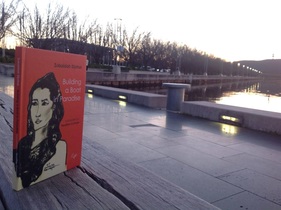 Dok. Pribadi Dok. Pribadi Good afternoon Everyone. It is an honour for me to see all of you here, and to listen to such powerful messages raised by wonderful speakers. I would like to express my gratitude to several people behind this event. I thank Mbakyu Jacinta Kurniasih, Mas Usman Hamid, and Mas Fitrian Ardiansyah for speaking. My publisher Mas Agus Sarjono from Komodo Books, and the support team Miss Nanda, Tgk Muhammad Riza, Najib Kailani, Patrick Anderson and Evi Eliyanah who shared their testimonials. My deep appreciation and respect to Mas Amrih Widodo and Professor Kathy Robinson who never tire of spreading peace and harmony in Indonesia and Aceh as well. Also to Heather Curnow, a patient and meticulous translator. The support of all of you has made this event possible. I don’t have enough words to express this beautiful feeling. Last but not least, to my lovely hearts Fayyaz and Fata who teach mommy to be firm in a way of humanity through their innocent and sincere love. And, thanks for Fajran Zain, a man who has known me since I was 17, for his enthusiasm in supporting this moment. There are three things I want to emphasize about this book launch and seminar. Firstly, what we are doing today is to fulfill a moral obligation, to open up and widen information, to discuss and maintain our memories. As Paul Ricouer said “We are preventing killing victims for the second time, so let their voices be heard and make those voices become important to us” We have a moral debt to victims everywhere and this is how we should repay it. Remembering is a way to uphold justice. This is the main reason why this book was written. As the author, I can not claim to fully represent the experiences of conflict victims. These poems cannot be compared with their suffering. This is only the testimonial of a researcher and human rights activist. Secondly: the writing process. I made some poems during my field work research entitled "Women and Peace" (in 2008), and more poems during my trip to 300 villages all over Aceh to facilitate training of political leadership and conflict resolution for village leaders (in 2009). Their words pop into my mind spontaneously anytime I am alone. One poem I wrote is called “The Old Well", after meeting a blind woman who was raped by soldiers during the conflict. The peace agreement of 2005 did not change her situation; she was still poor and severely traumatized. She spends all her days at the well showering to purify herself. She feels dirty due to that rape. At another time I met a woman who had an issue of reproductive health, her breasts were wounded, and her vagina constantly bleeding due to the rape, and she treated those wounds with leaves from wild plants in the backyard. I met women who had been accused of spying and feeding the rebels who hide in her house, or because she is a daughter or sister of a freedom fighter. I met a woman who had not a even a word to say after her husband was shot and raped her daughter in front of her in the Rumoh Geudong. I met a woman who took charge as a village leader after all residents, mostly young males, left the village to survive. In this role she had to negotiate with the army, protect the remaining elderly people, children and male residents, and even collect dead bodies found in the street. Unfortunately, after peacetime none of her efforts were recognized and her leadership was considered against Islamic law. Some poems reflect peace progress in Aceh and the misuse of Islamic law implementation. I wrote a poem “Building a Boat in Paradise” in 2011 describing a naive condition of Aceh. Despite aid pouring in from all over the world to help with post-tsunami and post-conflict recoveries, the victims, especially women and children, were left behind by these agendas. Violence against women in the name of religion, corruption, and poverty are increasing. Peace seems distant from the 2005 Helsinki spirit. The third factor is accountability. This is the second version of the book and written in English. It contains only 30 selected poems related to the peace progress in Aceh as we are commemorating 9 years of the peace agreement (15 August 2005 to 15 August 2014). The first version, written in bahasa Indonesia was entitled “Pulang, Melawan Lupa (Coming Home, Resisting Forgetting)” published in February 2012. It was launched in Aceh and attended by the government, religious leaders, customary leaders, activists and writers. The book has been discussed at ANU, and Marcus Mietzner was a Moderator. It has also been discussed in several other places in Indonesia, such as Padang, Jakarta, Yogyakarta, Semarang, Jepara, Madiun, and twice in Kuala Lumpur at major international literary events (2012 and 2013). Please bear in mind, it is not only about launching and reading the poetry, but a strategic campaign to fight against silence and denial, to uphold justice. And to restore the rights of victims. It is not merely writing and speaking, but working and contributing as well. I will close my testimony today with this simple statement: chronic wounds, non-stop disappointments, various illnesses, stings in every way, thorns in every gaze, antipathy in any connection but sincerity only sincerity will heal as love is a concern as love is an act let’s welcome a peace day for us thank you very much ! Comments are closed.
|
AuthorDewan Redaksi JP, Redaksi JP, pemerhati masalah perempuan Jurnal Perempuan terindeks di:
Archives
July 2018
|



 RSS Feed
RSS Feed